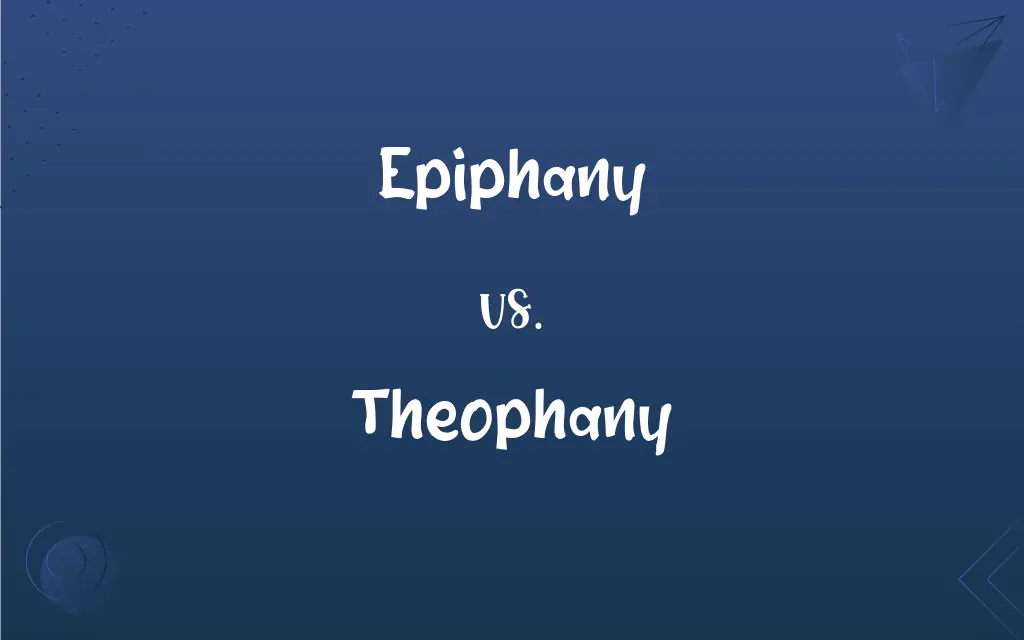Epiphany vs. Theophany: What's the Difference?
Edited by Harlon Moss || By Janet White || Updated on October 9, 2023
Epiphany refers to a sudden realization or insight, while Theophany denotes a visible manifestation of a deity.

Key Differences
Epiphany primarily denotes a sudden, profound understanding or realization that strikes an individual. On the other hand, Theophany pertains specifically to a divine manifestation where God appears to humans.
In literature or daily conversations, when someone mentions having an epiphany, they're often referring to a moment of clarity or insight about a particular situation. In contrast, theophany is a more specialized term, typically found in religious or theological discussions, describing moments when the divine reveals itself.
To many, the word epiphany has secular implications, capturing moments of human insight or understanding, although it can also have spiritual connotations. Theophany, however, is intrinsically linked to religious contexts, pointing to encounters between the divine and the mortal realm.
For instance, a scientist might experience an epiphany that leads to a breakthrough in their research. Meanwhile, a biblical example of theophany is when Moses encountered the burning bush, which was a manifestation of God.
Fundamentally, while both words can touch on spiritual experiences, epiphany has a broader application, encompassing any profound realization. Theophany, conversely, is solely centered on divine appearances or manifestations.
ADVERTISEMENT
Comparison Chart
Primary Meaning
Sudden realization or insight
Visible manifestation of a deity
Context of Use
Literature, daily conversations, sometimes spiritual
Religious or theological discussions
Associated Domain
Human understanding, occasionally spiritual
Strictly religious
Example
A scientist's breakthrough moment
Moses encountering the burning bush
Nuance
Can be secular or spiritual
Always related to a divine revelation
ADVERTISEMENT
Epiphany and Theophany Definitions
Epiphany
A profound realization.
Reading the novel, he had an epiphany about human nature.
Theophany
A religious event where God is perceptibly present.
Some saints have reported experiencing theophanies during deep prayer.
Epiphany
A manifestation of a divine being.
Some believe the star that led the Magi was an epiphany.
Theophany
An encounter between the divine and human.
For many believers, personal theophanies affirm their faith.
Epiphany
A literary device denoting a character's realization.
The protagonist's epiphany changed the story's direction.
Theophany
God's appearance in tangible form.
Some theologians debate the nature of different theophanies in scriptures.
Epiphany
A moment of sudden insight.
During meditation, she had an epiphany about her life's purpose.
Theophany
A divine revelation.
The biblical stories often describe theophanies to prophets.
Epiphany
Epiphany A Christian feast celebrating the manifestation of the divine nature of Jesus to the Gentiles as represented by the Magi, traditionally observed on January 6.
Theophany
A visible manifestation of God to humans.
The burning bush was a theophany for Moses.
Epiphany
A revelatory manifestation of a divine being.
Theophany
An appearance of a god to a human; a divine manifestation.
Epiphany
A sudden insight or intuitive understanding
"He had a painful epiphany about the absurdity of the job and quit" (Aleksandar Hemon).
Theophany
A manifestation of a deity to a person.
Epiphany
An illuminating realization or discovery, often resulting in a personal feeling of elation, awe, or wonder.
It came to her in an epiphany what her life's work was to be.
Theophany
A manifestation of God to man by actual appearance, usually as an incarnation.
Epiphany
A manifestation or appearance of a divine or superhuman being.
Theophany
A visible (but not necessarily material) manifestation of a deity to a human person
Epiphany
(Christianity) Epiphany.
Epiphany
An appearance, or a becoming manifest.
Whom but just before they beheld transfigured and in a glorious epiphany upon the mount.
An epic poet, if ever such a difficult birth should make its epiphany in Paris.
Epiphany
A church festival celebrated on the 6th of January, the twelfth day after Christmas, in commemoration of the visit of the Magi of the East to Bethlehem, to see and worship the child Jesus; or, as others maintain, to commemorate the appearance of the star to the Magi, symbolizing the manifestation of Christ to the Gentles; Twelfthtide.
Epiphany
A divine manifestation
Epiphany
Twelve days after Christmas; celebrates the visit of the three wise men to the infant Jesus
Epiphany
An Aha! moment.
After days of struggle, the solution came to her as an epiphany.
FAQs
Is "theophany" used in daily conversations often?
No, "theophany" is a specialized term, mainly used in religious contexts.
Is "theophany" always related to a divine appearance?
Yes, "theophany" always pertains to a visible manifestation of a deity to humans.
How is "epiphany" used in literature?
In literature, "epiphany" often describes a character's sudden realization or insight.
Can an "epiphany" be secular in nature?
Absolutely, an epiphany often refers to secular moments of insight or clarity.
Can "epiphany" refer to a divine manifestation?
Yes, although less common, "epiphany" can denote a divine manifestation.
Can a personal spiritual experience be termed as "theophany"?
If it's perceived as a manifestation or appearance of the divine, yes, it can be termed a "theophany".
How does "theophany" differ from "revelation"?
While both involve divine disclosure, "theophany" specifically denotes a visible or tangible appearance of God.
What does "epiphany" primarily refer to?
"Epiphany" primarily refers to a sudden realization or insight.
Are "epiphany" and "theophany" synonymous?
No, while both can refer to divine manifestations, their primary meanings differ.
In which religious texts can we find examples of "theophanies"?
Theophanies are found in various religious texts, including the Bible and the Quran.
Can someone's sudden understanding of a concept be termed as "theophany"?
No, that would be more appropriately termed an "epiphany".
Which term is broader in application, "epiphany" or "theophany"?
"Epiphany" has a broader application, encompassing various moments of realization.
Does "epiphany" have a specific religious festival associated with it?
Yes, Epiphany is a Christian feast day celebrating the revelation of Jesus as the Son of God.
What is the root of the word "theophany"?
"Theophany" comes from Greek, combining "theos" (God) and "phaino" (to show).
Is "epiphany" derived from Greek?
Yes, "epiphany" comes from the Greek "epiphaneia", meaning "manifestation" or "appearance".
About Author
Written by
Janet WhiteJanet White has been an esteemed writer and blogger for Difference Wiki. Holding a Master's degree in Science and Medical Journalism from the prestigious Boston University, she has consistently demonstrated her expertise and passion for her field. When she's not immersed in her work, Janet relishes her time exercising, delving into a good book, and cherishing moments with friends and family.
Edited by
Harlon MossHarlon is a seasoned quality moderator and accomplished content writer for Difference Wiki. An alumnus of the prestigious University of California, he earned his degree in Computer Science. Leveraging his academic background, Harlon brings a meticulous and informed perspective to his work, ensuring content accuracy and excellence.
































































